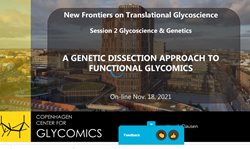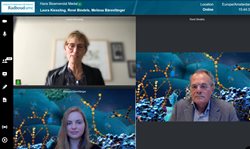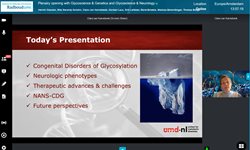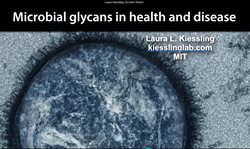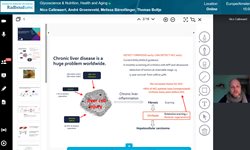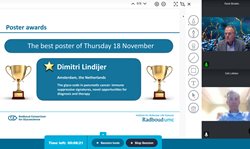Summary The impact of Glycoscience for future personalized medicine
The biannual New Frontiers series of the Radboud Institute for Molecular Life Sciences present the latest scientific developments of a chosen field of research and their potential for medical translation. The 2021 New Frontiers symposium on November 18-19 was on Translational Glycoscience. The human glycome has a major impact on every aspect of life sciences, from developmental biology to new forms of personalized diagnostics and therapy. After the genome, and proteome, the glycome presents a new perspective on human biology and disease by post-translational modification of proteins and lipids. read moreSummary The impact of Glycoscience for future personalized medicine
During this symposium, a range of national and international leading scientists provided a broad overview of the field of Glycoscience, from synthetic molecules and analytical chemistry to the role of glycosylation in personalized diagnostics and as therapeutic targets. They also shared their vision on the future of Glycoscience and discussed the challenges to be solved for broad embedding of glycosciences in medical research and clinical applications.
The program was highly diverse, offering keynote lectures with lively panel discussions, an interactive poster sessions, the Bloemendal award and college tour with Laura Kiessling, and a challenging pub quiz. Posters were awarded in the category of Glycoscience and by public voting on Day 1 and Day 2:
Poster awards:
- Glycoscience: Damian Perez-Martinez. Design and Synthesis of N-glycomimeDcs with high affinity for DC-SIGN
- November 18: Dimitri Lindijer. The glyco-code in pancreatic cancer: immune suppressive signatures, novel opportunities for diagnosis and therapy
- November 19: Federica Conte. A new plaform integrating metabolomics and 3D engineered heart tissue for functional and metabolic characterization and therapy-screening of metabolic cardiomyopathies in congenital disorders of glycosylation
We have learned that novel innovative tools are becoming available such as glycan arrays to screen for binding specificities and inhibitors in respiratory viruses, synthetic molecules to modulate glycosylation in for example cancer and neurological disease, and analytical methods for deep glycan sequencing and glycoprotein characterization via CryoEM.
We have learned about novel insights in the biology of glycosylation by studies in human diseases such as dysregulated glycosylation pathways in diverse cancers, inhibitory or stimulatory glycosylation profiles in cancer that are being exploited as novel immune-checkpoints, and genetic and environmental factors as basis for altered glycosylation in common diseases as diabetes and autoimmune disease.
Finally, we have learned that many tools have sufficiently matured to impact concrete medical applications, such as approved diagnostic tests for hepatocellular carcinoma, clinical therapeutic trials in genetic diseases, glycans influencing immunotherapy in cancer and health benefits of dietary glycans in infant milk.
Altogether, the future of Glycoscience is bright and promising by providing a novel perspective to influence the future of human medicine.
SESSION: Glycoscience & Genetics
An estimated 2-5% of our genome is crucial to ensure normal glycosylation. For the majority, the biological functions and importance for human disease are not yet fully known. In this session, genomic engineering is discussed for large scale functional classification of glycosylation genes, as well as the combined application of large scale genomics and glycomics to unravel human disease pathophysiology.
Henrik Clausen, University of Copenhagen, Denmark
A Genetic Dissection Approach to Functional Glycomics
Gordan Lauc, University of Zagreb, Croatia
What did we learn from the analysis of the first 150,000 glycomes
Future: Understanding Glycosyltransferase redundancy, moving towards Cell-type specific and protein-specific glycosylation.
SESSION: Glycoscience & Neurology
Whether we talk about brain development, neurotransmission or muscle innervation, glycosylation plays an important role. In this session, we will learn about the effects of dysfunctional glycosylation on the neuromuscular system by presentations on human genetic glycosylation disorders and studies on brain function in glycosylation-deficient mouse models.
Clara van Karnebeek, Amsterdam University Medical Center, the Netherlands
Sugar Therapy for CDGs?
Rita Gerardy-Schahn, Medical School Hannover, Germany
Lessons learned from mice deficient in the synthesis of polysialic acid
Future: Treatments, biomarkers for diagnosis and therapy monitoring, Regulation of polysialic acid.
SESSION: Glycoscience & Nutrition, Health and Aging
Prediction of disease onset and prevention of disease symptoms based on dietary interventions are important targets to improve our health. In this session, examples will be provided on the use of glycan signatures to predict different stages of liver disease and nutritional intervention based on glycans to reduce childhood infections.
Nico Callewaert, VIB-UGent Center for Medical Biotechnology, Belgium
'20 Years of glyco-based liquid biopsy development for cirrhosis and hepatocellular carcinoma risk'
André Groeneveld, Friesland Campina, the Netherlands
Glycosciences in a rare case of product development of an Infant Formula ingredient
SESSION: Glycoscience & Advanced methods/tools
The understanding of glycans in health and disease has been revolutionized by the rapid advancement of tools for their analysis in recent years. In this session, renowned experts will discuss the state-of-the-art and future in method development for Glycoscience by expert opinions on mass spectrometry, glycan arrays, and cryo-Electron Microscopy.
Geert-Jan Boons, Utrecht University, the Netherlands
Synthetic O-Acetylated Sialosides Facilitate Functional Receptor Identification for Human Respiratory viruses
Catherine Costello, Boston University School of Medicine, USA
The Challenges and the Promise of Glycoanalysis
Friedrich Förster, University Utrecht, the Netherlands
Structural insights into post-translational modification of nascent proteins in the ER using cryo-EM
SESSION: Glycoscience & Oncology
Cancer cell invasion, metastasis; glycosylation plays a role in many steps during oncogenesis, and even provides multiple targets for potential therapeutic intervention. In this session, key experts in the field will provide their perspective on the role of glycans in cancer development and immunomodulatory therapies.
Salomé Pinho, I3S-Institute for Research and Innovation in Health, University of Porto, Portugal
Complex N-glycans as immune-checkpoints in cancer: an opportunity to improve cancer immunotherapy
Heinz Läubli, University Hospital Basel, Switzerland
Sialic acids prevent effective cancer immunotherapy
Hans Bloemendal Medal
Laura L. Kiessling, Department of Chemistry, Massachusetts Institute of Technology, USA
Microbial Glycans in Health and Disease
SESSION: Glycoscience & Infectious diseases
Protein glycosylation influences the activity of immune receptors, regulates antibody function, and plays an important role in are recognized by pathogen-recognition receptors, which is an important step to mount an immune response against viruses, bacteria or fungi. This session will discuss the multiple crucial roles that glycan-mediated interactions play in immunity in the context of infectious diseases
Yvette Kooyk, Amsterdam Medical Center, the Netherlands
Glycocode of the tumormicroenvironment a novel immune check-point
Quirijn de Mast, Raboudumc, Nijmegen, the Netherlands
Platelet sialic acid and the endothelial glycocalyx: new avenues for treatment of dengue complications?
Manfred Wuhrer, Leiden University Medical Center, the Netherlands
Antibody glycosylation dynamics of viral and parasitic infections
The alteration of glycan structures often arises in the course of disease progression. Monitoring these differences in glycosylation can be of diagnostic value for example in the case of liver disease. Differences in glycans structure can also induce allergic cross-reactivities relevant to the food industry. From these examples it is clear that glycoanalysis has a bright future for a broad spectrum of applications relevant to nutrition, health and aging.
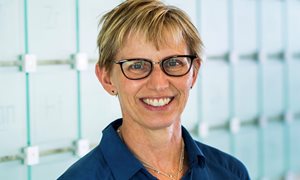
Hans Bloemendal Medal 2021 for Laura Kiessling
The Hans Bloemendal Medal for 2021 is awarded to Professor Laura Kiessling, in recognition of her groundbreaking work on carbohydrate-mediated interactions in cell-cell recognition and signal transduction.
Laura Kiessling is a Novartis Professor of Chemistry at the Massachusetts Institute of Technology. MIT is also the place where she started her scientific training in chemistry. She continued her education in organic chemistry doing her PhD at Yale University. After being an American Cancer Society postdoc at California Institute of Technology, she became a professor in chemistry at the University of Wisconsin-Madison in 1991 and was director of the Keck Center for Chemical Genomics. She moved back to MIT in 2017.
She has made seminal contributions to the fields of organic synthesis, polymer chemistry and molecular biology. In addition to synthesis of glycosyl donors, modified peptides and glycopolymers, she exploits these molecules to probe carbohydrate-mediated interactions in cellular recognition and signal transduction processes. Her finding that multivalent ligands can influence receptor-ligand binding and active signaling to target immune responses has opened the way to targeted immunotherapy and other treatments.
A vast list of awards and memberships illustrates the appreciation of her research contributions by the broad scientific community. On top of that, she served as the founding editor-in-chief of ACS Chemical Biology and contributed to the education of many young chemists and biochemists. Her dedication to teaching is exemplified by the position she held previously as director of the National Institutes of Health Chemistry-Biology Interface Training Program.
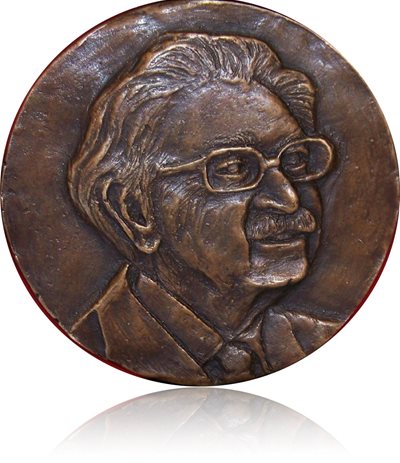

Poster prizes Prize winners 2021
Also this year a poster session was organized during the 2 day-symposium. A jury awarded the poster on glycoscience and the public voted two best posters. All received a certificate and an amount of money.
The prize winners of 2021 are:
The best poster category “Translatonal Glycoscience'':
- Damián Pérez Martinez, CIC Biomagune, Spain. Design and Synthesis of N-glycomimeDcs with high affinity for DC-SIGN
The best poster of Thursday 18 November:
- Dimitri Lindijer, Amsterdam, the Netherlands. The glyco-code in pancreatic cancer: immune suppressive signatures, novel opportunities for diagnosis and therapy
The best poster of Friday 19 November:
- Federica Conte, Nijmegen, the Netherlands. A new plaform integrating metabolomics and 3D engineered heart tissue for functional and metabolic characterization and therapy-screening of metabolic cardiomyopathies in congenital disorders of glycosylation

Public evening on Metabolic diseases
About 170 people all across the Netherlands joined the public evening about metabolic diseases on November 17, 2021. The presentations and discussions focused on the forefront of developments in this field: genetic therapy. Speakers included Rick Wansink, who explained the various forms of genetic therapy, and Boelo Boelens jr., who shared his personal experience of living with a metabolic disease and how an experimental genetic therapy impacts his life. The audience gained more insight into different stages of the research towards genetic therapy, patients in four short presentations by Rachel Mijdam, Rosanne Ausems, Karlien Coene and Marion Brands.
Afterwards, researchers and clinicians debated on questions related to genetic therapy and received a lot of input from the audience at home. Would you take the risk of participating in a clinical trial using genetic therapy? Can you make this choice for your child? Would you travel to the United States or elsewhere to get a better therapy? But also: do researchers take into account the patients’ needs or the true impact of their research?
The lively discussions led to one conclusion: patients, researchers and clinicians need each other to make the most significant impact on healthcare. Therefore: to be continued?
The public evening on metabolic diseases was organized by Radboudumc and the patient organization VKS. The public evening was connected to the scientific symposium New Frontiers on Translational Glycoscience.
Please find here the review of the public evening by Dirk Lefeber. The review is published in this online Wisselstof VKS (in Dutch)

